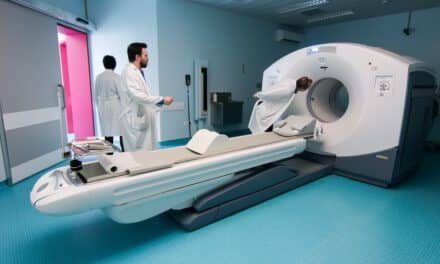The Society of Nuclear Medicine and Molecular Imaging (SNMMI) and peer medical groups have issued appropriate use criteria (AUC) for prostate-specific membrane antigen (PSMA) PET imaging. The criteria, published in the January issue of The Journal of Nuclear Medicine, are the product of an international multidisciplinary panel of expert healthcare providers and include a list of relevant clinical scenarios, a systematic review of evidence in the literature, and a systematic analysis of available evidence.
PSMA-targeted imaging agents are radioactive tracers that are used with PET scans to detect the presence of the PSMA protein, which is overexpressed in prostate cancer. PSMA PET imaging allows physicians to scan the entire body for PSMA proteins and provides a detailed depiction of the extent of the disease.
“The Food and Drug Administration recently approved two PSMA PET agents—18F-DCFPyL and 68Ga-PSMA-11—for diagnostic imaging of patients with suspected or known prostate cancer. With these approved imaging agents, plus more on the horizon, the development of AUC was necessary to aid referring medical practitioners in appropriate use of PSMA PET imaging for their patients,” says Hossein Jadvar, MD, PhD, MPH, MBA, FACNM, FSNMMI, professor of radiology, urology, and biomedical engineering at the Keck School of Medicine & Viterbi School of Engineering at the University of Southern California in Los Angeles and a past president of SNMMI.
The article includes 11 scenarios for patients with prostate cancer, ranging from initial staging to biochemical recurrence to castration-resistant prostate cancer. Each scenario is scored as “appropriate,” “may be appropriate” or “rarely appropriate” based on evidence and expert opinion regarding diagnostic accuracy, as well as effects on clinical outcomes and clinical decision making. Other factors affecting the AUC scores were potential harm, costs, availability, and patient preferences.
“The development and use of AUC documents for advanced diagnostic imaging services is an important process in providing patients with appropriate imaging care. These criteria will be instrumental in improving patient outcomes and reducing overall cost to the healthcare system,” notes Jadvar.
A multipronged approach will be utilized to disseminate the AUC for PSMA PET in prostate cancer to all relevant stakeholders—referring physicians, nuclear medicine physicians, and patients. Tactics will include a mix of outreach and educational activities that will be targeted to each of these audiences. In addition to these activities, SNMMI aims to create a mobile application for the AUC for both Apple and Android platforms.
The AUC were created by a multidisciplinary panel of healthcare providers with substantive knowledge of prostate cancer. The panel included representatives from SNMMI and the American College of Nuclear Medicine, the American College of Physicians, the American Society of Clinical Oncology, the American Urological Association, the Australian and New Zealand Society of Nuclear Medicine, and the European Association of Nuclear Medicine. The process for AUC development was modeled after the RAND/UCLA Appropriateness Method for AUC development.






